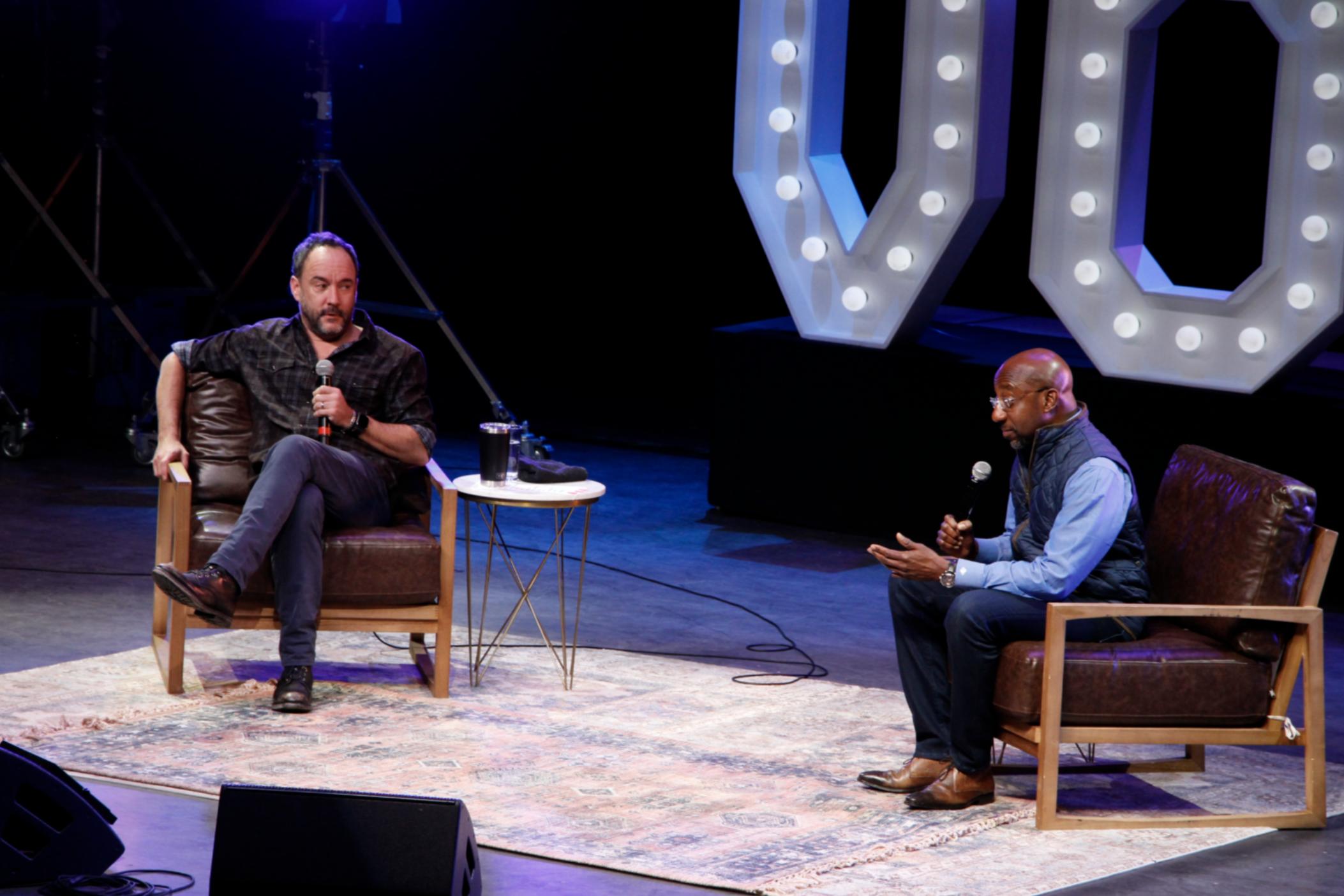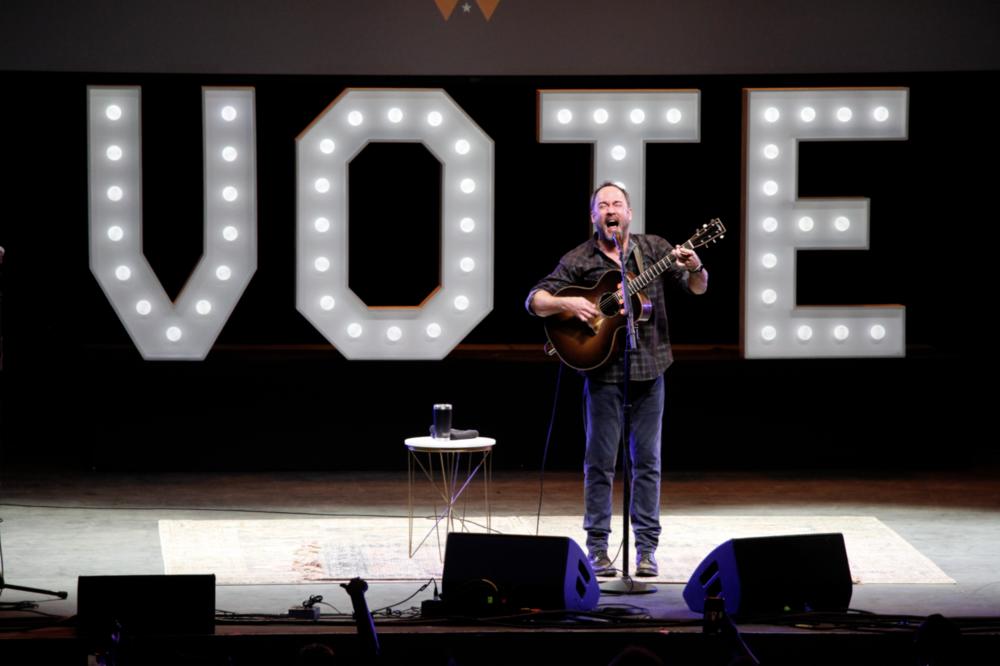Section Branding
Header Content
In a tight runoff race, Warnock turns up the music — with Dave Matthews
Primary Content
LISTEN: Dave Matthews, who performed at a rally for Sen. Raphael Warnock in Atlanta, talks about former President Jimmy Carter and the influence of music and politics on Nov. 28, 2022.
__
Musicians are no strangers to U.S. political campaigning. Since the dawn of the 19th century, politicians and activists of all parties have used popular songs on the trail and invited singers to perform at rallies and advocate for social issues.
The practice dates to “Jefferson and Liberty,” a traditional Irish folk tune re-set to political lyrics popularized after Thomas Jefferson defeated John Adams in the 1800 presidential election. Later came Irving Berlin’s “I Like Ike” for Dwight Eisenhower in 1952, “High Hopes,” a Frank Sinatra smash by James Van Heusen with Sammy Cahn lyrics retrofitted for John F. Kennedy in 1960, and indelible performances by Mahalia Jackson, Joan Baez and Bob Dylan at the 1963 March on Washington.
In recent decades, Georgia politicians have swayed voters with music, too: Jimmy Carter brought the Allman Brothers Band along for the ride when he ran for president in 1976. Late U.S. Rep. John Lewis joyfully danced to Pharrell’s 2013 hit “Happy” everywhere he went. And at two events during Stacey Abrams’ 2018 run for governor, she and Oprah sashayed onstage to “Sisters Are Doin’ It for Themselves” by Eurythmics and Aretha Franklin.
Following in that tradition, Democratic U.S. Sen. Raphael Warnock’s Nov. 28 Atlanta rally with singer Dave Matthews seemed par for the course: In the weeks prior, Broadway star Lin-Manuel Miranda, 42, had campaigned with Warnock and Latino candidates here; Sheryl Crow, 60, played a guitar emblazoned with a Warnock sticker at Atlanta’s Mercedes-Benz stadium Nov. 11 in front of a crowd of 50,000; and Stevie Wonder, 72, lent his 1973 hit “Higher Ground” as de facto walk-on music for Warnock, whom he broadly endorsed online.
But days before the historic Dec. 6 runoff election against Republican challenger and former University of Georgia football player Herschel Walker — the first between two Black senatorial candidates in Georgia — the incumbent Sen. Warnock, 53, and the pastor of Ebenezer Baptist Church, welcomed a generational peer in Matthews, the 55-year-old progressive rocker from Seattle by way of Johannesburg, South Africa and Charlottesville, Va., to play a venue at the Battery in baby-blue Cobb County, Ga., a suburban area northwest of Atlanta where 61% of the population is white and voters went for Clinton and Biden by decent margins in the 2016 and 2020 presidential elections.
The event attracted a sweet spot of Generation X attendees in a state where the oft-forgotten demographic has suddenly become one of the most hotly contested at the ballot box.
Behind the number crunching and song selection
Before Matthews brought out a guitar and told a packed Coca-Cola Roxy Theatre that he'd been "insinuating" himself into Warnock's campaign for months, a DJ warmed up the crowd with songs by Michael Jackson, Journey, Queen and the Bee Gees. A variety of ages attended, but spectacles and salt-and-pepper hair were the dominant trends of the evening.
Concertgoers Dara Morris from Dunwoody and Jennifer Brown from Atlanta told GPB's Peter Biello their support for Warnock was based on women's rights and voting access, and that the alternative wasn't an option.
Morris said she worried other voters may have difficulty casting a ballot.
“If they’re disenfranchised because of the voting laws that are passed, that’s what ends up happening: Walker wins," Morris said. "And that’s scary.”
As Elton John's "Bennie and the Jets" blared in the background, David and Isabelle Herring explained they drove from Milton to support Warnock and also that they needed a dose of Matthews' "energy."
David Herring considers himself part of an engaged generation that grew up with the intertwined music and politics of Live Aid, which he archived on Beta cassette.
"The impact of those shows was extraordinary," he said.
Warnock's pregame playlist made perfect sense considering that voters age 50-55 represented the largest share (10.4%) of turnout in Cobb County on Nov. 8 amongst all brackets of voters spanning ages 18-100. Warnock led Cobb County by 16 points in this year’s general election and data from the Georgia secretary of state’s website supports the strong turnout of millennial and Gen Z voters and Gen Xers aged 42-57, which may have contributed to Warnock’s lead.
But numbers for early voting, which started Saturday, Nov. 26 and ends Friday, Dec. 2 before runoff election day on Dec. 6, show the 65- to 70-year-old set leading stats statewide, which means Warnock's outreach to Gen X supporters is warranted: A summer AARP poll of Georgia voters released two days before Thanksgiving showed that 43% of voters ages 50 and up favor Warnock versus Walker’s 53%, but Warnock led Walker 61% to 37% percent among voters ages 18-49. Georgia’s Gen X voters may fall somewhere in between those groups, especially considering 90% of Black voters 50 and up said they support Warnock over Walker, compared with only 21% of polled white voters in the same age group.
It all comes down to turnout, and that's why Warnock is pulling out all the stops, even bringing his TV commercial friend Alvin the beagle to say hello to his supporters before sitting down with Matthews for a fireside chat about "preaching to the choir" — and convincing every music fan in the room to text five friends to ask them to vote.
The senator said he knew the music fans were mainly there for Matthews but he couldn't pass up the opportunity to tout accomplishments such as helping push through the confirmation of Supreme Court Justice Ketanji Brown Jackson and passing legislation like the infrastructure bill and the child tax credit.
Then he introduced Matthews, who played a career-spanning 14-song set that was equal parts pub singalong and intricate balladry, informed by the echoes of Pete Seeger, Willie Nelson, Bob Marley and a globetrotting 1970s childhood. Notable standout included the new-ish "Something to Tell My Baby" — a wish for making a better world for the next generation that he also played at a private event for Abrams last spring — and stalwarts "Samurai Cop (Oh Joy Begin)," "Satellite" and "Mercy." The between-song patter was silly enough to keep patrons lined up at the bar at the back of the room while the lyrics of "Don't Drink the Water" and "Gravedigger" did the heavy lifting, with the spirited strumming of 1995's "Ants Marching" as the inevitable closer.
Serenading Gen X for their votes
After the set, it's clear why Warnock is utilizing Matthews — a celebrity out-of-towner with a mile-long list of political and charitable performances under his belt — in Georgia now: the two share a worldview shaped by videos of Martin Luther King Jr.’s speeches, Cold War nuclear fears and the promise of unity offered in cultural moments such as "We Are the World" in 1985 or the aftermath of 9/11, where music became synonymous with generosity and hope.
Backstage in an interview before the show, Matthews, who was naturalized as a U.S. citizen in 1980, said it was also Georgia's "rock and roll president" Jimmy Carter who first awakened his interest in politics sprinkled with guitar riffs and civic duty.
"I remember as a kid, just thinking he was the coolest president," he said. "He was really the first president that I identified with. And my mother was very politically active here in the States, but also when we lived for a while in Johannesburg. And so seeing that and seeing my mom, a professional architect, and that she would take time to participate in the political process — whether she was invited or not, you know, because in South Africa, obviously, there was a different fight going on.
"But I just feel like growing up with the music that I did and in the places that I did, it made me sort of hyper aware ... of the consequences of letting people that shouldn't be in power — or you don't want in power — have power because of indifference. You know, indifference can really allow things to go off the rails. And I think that's kind of where we are right now in this very strange period."
It's true Matthews' track record of political involvement is dominantly Democratic — he has been involved with Farm Aid, played Atlanta's Piedmont Park fundraiser in 2007 and organized the Concert for Charlottesville in 2017 after the deadly white supremacist rally there — but his views may be on the side of the people in Georgia, a state where two-thirds of voters object to the state's abortion restrictions and a majority also supports sensible gun control.
For many Georgians, 2022 has been filled with whiplash legislation: First, after the June ruling on Roe v. Wade by the Supreme Court, Georgia’s 2019 law limiting abortion to before six weeks went into effect. Months later, a subsequent state court ruling invalidated the ban, then days after, another stayed the ban. In April 2022, another law eliminated the government permit requirements for carrying firearms in public, resulting in a pro-gun lawsuit that questioned the right of promoters to hold weapon-free concerts in public parks, triggering the September cancellation of Music Midtown, one of the largest music festivals in the country, and giving touring artists pause before routing shows through Georgia.
Why politicians won't let the music die
Politicians on both sides of the aisle employ music to create a sense of unity when words fail. If musicians' support for politicians seems one-sided in favor of Democrats, it's not for lack of trying by Republicans.
Richard Nixon huddled with Johnny Cash and Elvis Presley, while George W. Bush befriended U2 singer Bono. John Mellencamp, Neil Young and the Rolling Stones asked both the late Sen. John McCain and Donald Trump to stop using their songs on the trail in 2012 and 2016, eventually joined by nearly two dozen other artists during Trump's presidency. Just last week, the estate of Isaac Hayes threatened legal action against Trump when he again used the Sam and Dave song “Hold On, I’m Coming” at his 2024 presidential announcement.
Lee Greenwood, writer of "God Bless the U.S.A." has stuck by Trump without any reputational baggage, but many country artists stay mum about their political views, especially in the wake of the Chicks' (then called the Dixie Chicks) blacklisting after their anti-Bush comments in 2003.
Warnock's runoff opponent Walker has played George Thorogood's 1982 "Bad to the Bone" on the trail this year without problems, but hip-hop artists Bone Thugs -n-Harmony expressed disappointment in a Twitter thread that mocked Walker's recent use of their song, “Tha Crossroads."
At a time in U.S. politics when truth is a moving target, music is a trusted constant despite its morphing to reflect the culture and push for social change. Onstage at the Roxy Theatre, Warnock told the audience that he was not in love with politics, but in love with change. And the lyrics of Matthews' "Ants Marching" lingered in the air as event ended, cementing generational bonds and urging folks to choose action over indifference by casting their votes in the runoff.
But it was Stevie Wonder, in a late-night video posted by Atlanta producer Jermaine Dupri on Nov. 3, who best captured the link between music and politics.
"We can’t keep going backwards doing the same thing," he said after asking Georgians for a vote for Warnock. "We as songwriters are trying to ‘Make America Love Again.’”
At the end of an arduous election season, more music may be just the kind of love voters need to get them to the booth one more time.
GPB's Peter Biello contributed reporting to this article.



